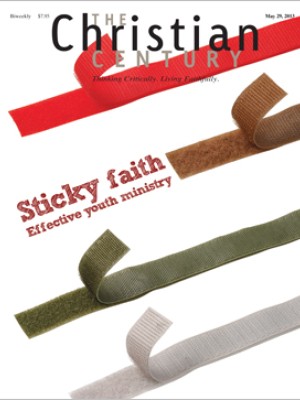Morning companions
Each morning I or a colleague open up our church in Trafalgar Square for a period of meditation before the service of morning prayer. It takes all my strength to move the heavy gates and a dose of humility to turn up for duty. When I was dean of a distinguished university chapel in the U.S., this kind of thing was well below my pay grade. It’s taken some getting used to, especially as the icy English winter has subsumed what we used to call spring.
Once I’ve opened the doors, a couple dozen shadowy figures follow me in, searching for warmth and sleep after a night outside. These ghosts are mostly from beyond the European Union. Their asylum claims have been turned down, and they aren’t regarded as refugees. Their status is NRPF—no recourse to public funds—which means spending the night on a city bus, in a dusky entranceway or on a friend’s floor. How gruesome their prospects must be in their own countries if this half-life is considered so much more desirable. For me, these people are a daily encounter with the face of Christ.
Read our latest issue or browse back issues.
They are the shadow side of the welfare state. The benefit system isn’t a great burden on the nation if most people are working and paying taxes, but it’s tough for the treasury to make the sums add up when over half the population is receiving benefits. The treasury gurus are eager to stimulate the economy, cut taxes for businesses and wealth creators, and invest in infrastructure. But the first strand in a complex discussion is: Who will pay for this? Austerity creates its own ethic.
Meanwhile a populist strand is leaping on the anomalies in the benefits system—the household that receives more in welfare than it would earn through work, the immigrant living in apparent luxury at the state’s expense, the single person subsidized to live in a house suitable for a large family. Such stories fuel exasperation and xenophobia.
Recently a third strand of the conversation has surfaced, a strand not heard so stridently since Margaret Thatcher lauded her father’s grocery store in Lincolnshire. We’re starting to hear that work is a source not just of income but also of dignity, health, valued relationships, confidence, civic spirit and public good. To create a situation where a person could earn more on welfare than in work is a diminishment of the person, a failure of government, a perversion of power. The point is a theological one. Any disincentive that government puts in the way of the individual seeking work denies that person a flourishing life. It’s a barrier to the kingdom of God and, in that sense, an evil.
Yet in the current climate, welfare reforms will add to the suffering. In March, 43 Anglican bishops complained that the government’s welfare reforms, principled as they may be, will hurt children the hardest by taking another 200,000 under-16s into poverty. This is, after all, why the welfare state exists: to prevent people from becoming destitute when the usual building blocks of life—work, home, family and community—are scarce, damaged or absent. Personal economic independence is all very well as a goal, but it’s obtuse to pretend that it always works for everybody.
The bishops’ protests are attacked from three sides. There’s the pragmatic “don’t you realize this is austerity” assertion. These critics have a point; but once government has taken up preaching, it can hardly blame the church for taking an interest in policy making. The truth is that when tax income is so short and the welfare budget so unbalanced, this debate isn’t really about austerity. If it were, we’d be talking about where wealth really lies (not among benefit recipients) and where most of the welfare budget really goes (pensions).
Then there’s the populist “these people are layabouts” approach. Yet the children under 16 who are most likely to be plunged into poverty by benefit reforms are almost all children of working parents. Housing, heating and food cost more, while wages bring in less. The number of people who are economically better off not working is very small.
Finally, there’s the “we’re actually helping these children by making their parents live a more dignified life” claim. This is the real issue. Who would deny the value of employment? Work is a source of great good, socially and personally. In safe conditions, with respectful relationships, appropriate rewards and due dignity, it’s an integral feature of flourishing life and the bedrock of the economy. The problem is that such work is hard to find.
Ironically, bishops are asking the government, “Have you been outside lately? Are you letting your theology prevent you from seeing what’s going on?” We’re used to it being the other way round.
As I sit and meditate in the mornings, surrounded by able young people who take nothing in benefits and are not allowed to seek paid work, I find myself thinking that this debate is really about seeing rather than believing. Whom and what do we allow ourselves to see? Perhaps opening up the church in the morning is the most important thing I do.








